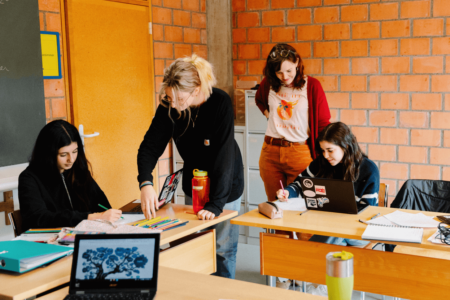LeRand Dixon never imagined his children would go to boarding school, let alone two children, each with unique characters and needs. But when the necessity arose and his wife stumbled upon Ecole d’Humanité’s website, they knew it was “the place” for their son Shiloh.
For LeRand, the boarding school had to meet two requirements: Shiloh’s academic ambitions should be supported, and the boarding environment should be supportive and nurturing. Several aspects of Ecole d’Humanité assured them: a non-traditional grading system, AP® courses, sports opportunities like skiing, archery, rock climbing and kayaking, afternoon classes like blacksmithing, and calligraphy, and a non-uniform requirement.
“My wife and I were intrigued by the focus on educating the whole child in areas outside academics, the division into families, the limited use of personal devices, the unique way of teaching subjects in an atypical and more engaging manner, co-ed student body, the location, and the kindness and responsiveness of the admissions staff,” he says.
Over spring break in his first year, Shiloh came home and said something that told LeRand he had made the right choice. He said his younger brother Asher would like Ecole d’Humanité too and convinced Asher to join him. It wasn’t long before Asher was taking part in service and activities, becoming a part of the school.
What’s striking to LeRand about the experiences of his two sons is this: one’s a confident high academic achiever and the other takes life more slowly. Despite their differences, both have gained a lot — with Asher becoming more interested in his subjects, independent and confident in a matter of months. “Our experience with the Ecole has been incredibly unique,” says LeRand.
A meaningful education for a life of meaning
Ecole d’Humanité aims to prepare students like Shiloh and Asher for a life rich in fulfilment and meaning. Its brand of progressive education is geared towards creating meaningful interactions – in the classroom, on the hiking trail, in the studio, and in the community. Meaning in the classroom starts with thematic teaching — that is, presenting academic material in a way that captures interests, inspires, motivates and ultimately produces better learning outcomes.
Teachers begin planning themes as early as the previous term, using suggestions from students. “Recent examples include ‘The Geography of Hip Hop,’ where students learned about urban development and social issues by comparing hip hop lyrics with other primary and secondary sources, and ‘Alpine Geology,’ which allowed students to apply key concepts from Earth Science to our local environment,” says Deputy Director Sarah Schnack. “In English classes, students have requested mythology, poetry, and dystopian literature courses.”
Before any student joins a class, teachers get to know their strengths, challenges, interests, learning preferences, and needs. As the teacher-to-student ratio is 1:4 and the curriculum is flexible and responsive, teachers can offer various materials, resources, and tasks adjusted based on individual progress and interests. With this approach, Shiloh is free to explore his academic interests and Asher has rediscovered the joy of math thanks to an encouraging teacher.
Instead of traditional grades, students receive narrative feedback — shifting the focus from one of exams and competition to one of growth and development. “Teachers consider various aspects of a student’s learning journey, including their engagement, critical thinking, collaboration, and creativity, contributing to a comprehensive assessment of their abilities,” says Schnack. “Students and parents receive insights into how a student has progressed over time, fostering a mindset of continuous improvement and learning. Without the constant focus on grades, students may be more motivated by a genuine interest in learning rather than external rewards.”
Whether a student takes the US High School Diploma with the option of completing the Advanced Placement International Diploma® or the Swiss Secondary Programme, they get a holistic education that focuses on critical thinking, problem-solving, and the cultivation of social skills. In 2022/23, 100% of students in the AP® Path programme passed their exams and the school’s average was well above both the Swiss national average and the global average for AP exam scores.

The co-curricular programme, including multi-day hikes and activities like kayaking and skiing, helps students connect with nature and discover the joys of movement. Source: Ecole d’Humanité
A rich, varied co-curricular programme that supports intellectual, social, emotional, and creative growth
In a week, Shiloh can be found playing piano at the assembly, practising drums, leading initiatives in the student government group Polygon, playing volleyball, kayaking, skiing, volunteering and creating videos while hiking. Although Asher has been there for just a few months, he’s taken part in gymnastics, blacksmithing, silversmithing, volleyball, and rock climbing. Both no longer feel pulled to their digital devices. Another student, Finn Milo Record, is just as busy. These days, he spends much of his free time skiing at the local ski resort. Last autumn, Record took part in a caving trip, squeezing through tiny passages and climbing steep taverns in Europe’s biggest cave.
Through Ecole d’Humanité’s outdoor programme, students not only boost their physical health but also improve their resilience, problem-solving, communication, and adaptability. Soft skills aside, they realise their role as stewards of our planet. “Students develop an appreciation for nature and a deeper understanding of environmental issues, aligning with the school’s belief that closeness to nature is crucial in developing a student holistically,” says Schnack.
Ecole d’Humanité’s arts and handcrafts programmes provide avenues for creative expression. There are conventional subjects (like painting, theater, baking) and far less common options (like blacksmithing, glass bead making, Chinese cooking, and architectural drawing, just to name a few from this term alone). “These programmes recognise and nurture various intelligences beyond traditional academic measures,” says Schnack. “Students with strengths outside the classroom find outlets for expression and growth.”
A home for a multi-generational group of learners from over 20 countries
At the Ecole d’Humanité, eight to 12 students reside in simple mountain chalets led by two or three “Family Heads.” In these co-ed, multi-age, and multilingual homes, each student lives with a roommate in rooms that have a twin bed, a workspace, closets, and storage space. The view from the window is the Bernese Alps, located south-east of the Swiss capital city Bern.
Adjoining the boarding space, “Family Head” apartments always house teachers, meaning there is always someone on hand to help students with problems big and small – locating a lost power cable or navigating a friendship conflict. “In family groups, we eat meals together, cook and plan activities for Family Nights each Wednesday, maintain the cleanliness of our shared spaces, support each other through homesickness and other challenges, and learn to set boundaries and solve disputes,” says Schnack.
Before boarding here, Record came from a starkly different background, culturally and politically. He adapted and grew in this new environment “which had so much to teach me about tolerance and diversity, but also proved a testing ground for my personal values that helped shape and refine them,” he says.
It is within these simply and purposefully outfitted spaces that Record found “friends for life as well as people I consider siblings.” Despite almost everyone on the English side of his family being educated at boarding schools around the world, Record believes none has as close-knit and harmonious a school community as the one he found here. “Our family structure here at the Ecole was at the heart of my development at this school.”
Book a call to learn more about Ecole d’Humanité.











